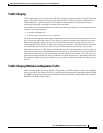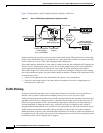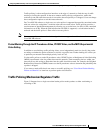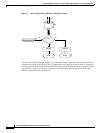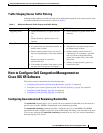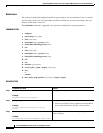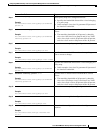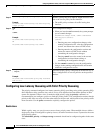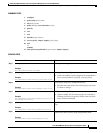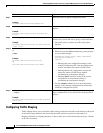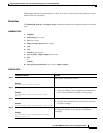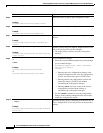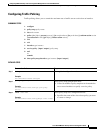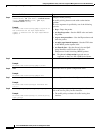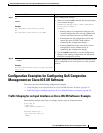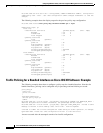
Configuring Modular Quality of Service Congestion Management on Cisco IOS XR Software
How to Configure QoS Congestion Management on Cisco IOS XR Software
QC-41
Cisco IOS XR Modular Quality of Service Configuration Guide
SUMMARY STEPS
1. configure
2. policy-map policy-name
3. class class-name
4. police cir kbps [exceed-action action]
5. priority
6. exit
7. exit
8. interface type instance
9. service-policy {input | output} policy-map
10. end
or
commit
11. show policy-map interface type instance [input | output]
DETAILED STEPS
Command or Action Purpose
Step 1
configure
Example:
RP/0/RP0/CPU0:router# configure
Enters global configuration mode.
Step 2
policy-map policy-name
Example:
RP/0/RP0/CPU0:router(config)# policy-map voice
Enters policy map configuration mode.
• Creates or modifies a policy map that can be attached to
one or more interfaces to specify a service policy.
Step 3
class class-name
Example:
RP/0/RP0/CPU0:router(config-pmap)# class voice
Enters policy map class configuration mode.
• Specifies the name of the class whose policy you want
to create or change.
Step 4
police cir kbps [exceed-action action]
Example:
RP/0/RP0/CPU0:router(config-pmap-c)# police cir
250 exceed-action drop
Configures traffic policing.
• In this example, the low-latency queue is restricted to
250 kbps to protect low-priority traffic from starvation
and to release bandwidth.
Step 5
priority
Example:
RP/0/RP0/CPU0:router(config-pmap-c)# priority
Specifies priority to a class of traffic belonging to a policy
map.
Step 6
exit
Example:
RP/0/RP0/CPU0:router(config-pmap-c)# exit
Returns the router to policy map configuration mode.



